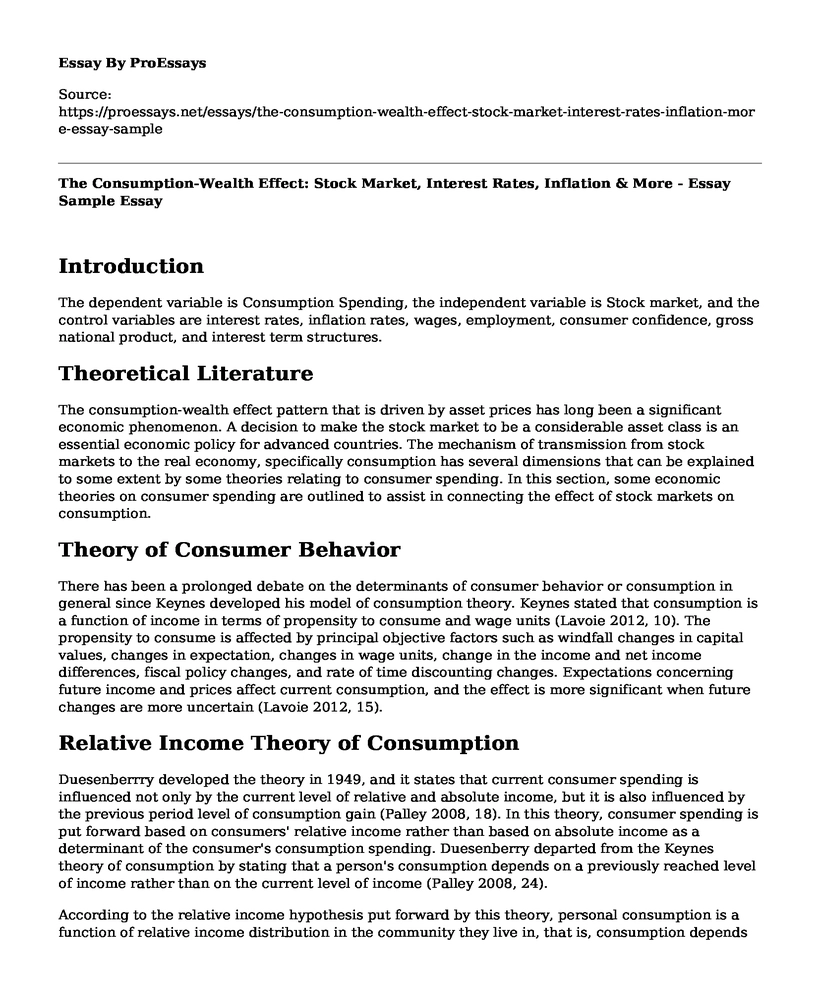Introduction
The dependent variable is Consumption Spending, the independent variable is Stock market, and the control variables are interest rates, inflation rates, wages, employment, consumer confidence, gross national product, and interest term structures.
Theoretical Literature
The consumption-wealth effect pattern that is driven by asset prices has long been a significant economic phenomenon. A decision to make the stock market to be a considerable asset class is an essential economic policy for advanced countries. The mechanism of transmission from stock markets to the real economy, specifically consumption has several dimensions that can be explained to some extent by some theories relating to consumer spending. In this section, some economic theories on consumer spending are outlined to assist in connecting the effect of stock markets on consumption.
Theory of Consumer Behavior
There has been a prolonged debate on the determinants of consumer behavior or consumption in general since Keynes developed his model of consumption theory. Keynes stated that consumption is a function of income in terms of propensity to consume and wage units (Lavoie 2012, 10). The propensity to consume is affected by principal objective factors such as windfall changes in capital values, changes in expectation, changes in wage units, change in the income and net income differences, fiscal policy changes, and rate of time discounting changes. Expectations concerning future income and prices affect current consumption, and the effect is more significant when future changes are more uncertain (Lavoie 2012, 15).
Relative Income Theory of Consumption
Duesenberrry developed the theory in 1949, and it states that current consumer spending is influenced not only by the current level of relative and absolute income, but it is also influenced by the previous period level of consumption gain (Palley 2008, 18). In this theory, consumer spending is put forward based on consumers' relative income rather than based on absolute income as a determinant of the consumer's consumption spending. Duesenberry departed from the Keynes theory of consumption by stating that a person's consumption depends on a previously reached level of income rather than on the current level of income (Palley 2008, 24).
According to the relative income hypothesis put forward by this theory, personal consumption is a function of relative income distribution in the community they live in, that is, consumption depends on personal income relative to incomes of other people in the society (Palley 2008, 29). If the proportion of income that is allocated to consumption at each level of income remains the individual experiences the same as the increase in income, then the community aggregate consumption as a proportion of the individual's income will also be constant through there is an increase in absolute consumption.
Life Cycle Theory of Consumption
The theory is the post-Keynesian theory of consumption, which was formulated by Modigliani and Ando. According to this theory, consumption is not a function of the current income of the same period, but it applies to income expected in the whole lifetime. Consumers are assumed to plan various consumption expenditure based on the income that is expected in their entire lifetime (Deaton 2005, 7). Also, it is assumed that consumers maintain a less or more constant or slightly increasing consumption level. However, this consumption level is limited by consumer's expectations of the income to be received in a lifetime (Deaton 2005, 9). A typical consumer in this theory in his or her early years consumes using borrowed money or spending transfers from parents. In the working years, the consumer spends less than what it is earned; then, after retirement, the same consumer now spends more than his or her income in the later years of life, where there is a slight possibility of increasing consumption in these later years. In this theory also, the consumption of some individuals is affected by the wealth they possess.
Conclusion
In conclusion, the three theories explain how consumer spending is determined. The outstanding factor is income, as it is the most significant independent variable that affects consumption. For the case of this research, Stock prices change income, which relates to individual wealth.
References
Deaton, Angus. "Franco Modigliani and the life cycle theory of consumption." Available at SSRN 686475 (2005). Available at https://papers.ssrn.com/sol3/papers.cfm?abstract_id=686475
Lavoie, Marc. "Consumer theory." In the Elgar Companion to Post Keynesian Economics, Second Edition. Edward Elgar Publishing Limited, 2012. Available at https://www.elgaronline.com/view/nlm-book/9781849803182/chapter21.xml
Palley, Thomas I. "The Relative Income Theory of Consumption: A Synthetic Keynes-Duesenberry-Friedman Model." (2008). Available at https://scholarworks.umass.edu/peri_workingpapers/140/
Cite this page
The Consumption-Wealth Effect: Stock Market, Interest Rates, Inflation & More - Essay Sample. (2023, Apr 20). Retrieved from https://proessays.net/essays/the-consumption-wealth-effect-stock-market-interest-rates-inflation-more-essay-sample
If you are the original author of this essay and no longer wish to have it published on the ProEssays website, please click below to request its removal:
- Financial Markets and Monetary Policy
- Types of Attitude Towards Risks in Investments
- Rebuilt Title Car Isn't Bad Essay Example
- Initial Public Offering Value of Facebook Supply Paper Example
- Essay Example on Who Owns a Child? Exploring the Debate on Paternity Fraud Laws
- Essay on Evaluating Health Insurance Program: Taqueria Tsunami's Contribution Strategy
- Blockchain: Transforming Industries and Sparking Innovative Discussions - Essay Sample







